
Harvard Business
School (PMD-59)
Cat: MIS
Pub: 1990
#: 9011a
Kanzo Kobayashi
07501u/18206r
Title
HARVARD BUSINESS SCHOOL (PMD-59)
ハーバードビジネススクール研修報告
Author
Kanzo Kobayashi
小林寛三
Published
May 1990
1990年5月
Index
Why?
- I remember 3 months from
winter to spring at Boston in 1990, when I took part 3 month incentive
business training program (called PMD =Program for Management
Development) at Harvard Business School (HBS). When I think of
it now, the year of 1990 was the summit of Japanese economy
- Following is the report
sent to Itochu just after the return to Tokyo in 1990. I hope
this will be some help for followers of the similar training program,
because the contents are still fresh and useful.
(Wrote in Nov. 1998)
- 1990年のまだ雪に閉ざされたボストンのハーバードビジネススクールでの3ヶ月間の思い出は今でも鮮明に覚えている。思えば、日本が一番勢いがあった年にビジネススクールで熱い議論を闘わせたのだ。
- 以下、帰国後すぐに伊藤忠に提出した研修報告記です。これから同様の研修に行く人達にとって何かの参考になれば幸いです。
(1998.11.8記)
Summary
要約
>Top 0. Harvard
Business School:
 Here is a
report of my participation to 3-month PMD business training course
at Harvard Business School from Feb. 3
until May 7, 1990. This program is targeted for the middle management
participants mainly coming from big organization to give intensive
business training program. I express deep appreciation to Itochu
Corporation giving me such invaluable experience.
Here is a
report of my participation to 3-month PMD business training course
at Harvard Business School from Feb. 3
until May 7, 1990. This program is targeted for the middle management
participants mainly coming from big organization to give intensive
business training program. I express deep appreciation to Itochu
Corporation giving me such invaluable experience.
0. ハーバード・ビジネススクール:
-
今般、HARVARD BUSINESS SCHOOLのPMD (Program For Management Development)研修に参加してきました。以下ご報告します。なお、このような貴重な体験をさせていただいた会社に改めて深謝します。
- 期間: 1990年2月3日~5月7日
- 場所: Harvard Business School, Boston, MA, USA
- 目的: 中堅幹部対象の集中研修プログラム (PMD) に参加のため
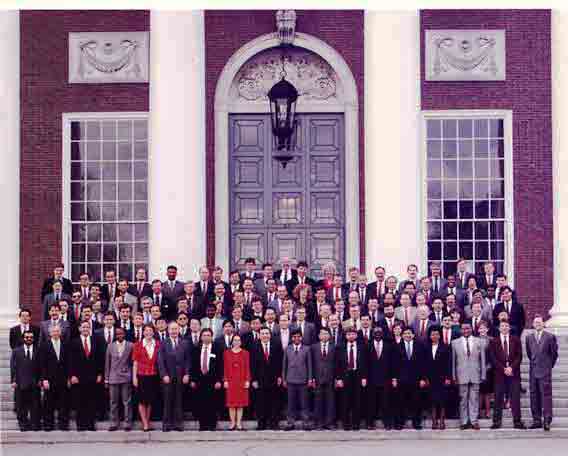
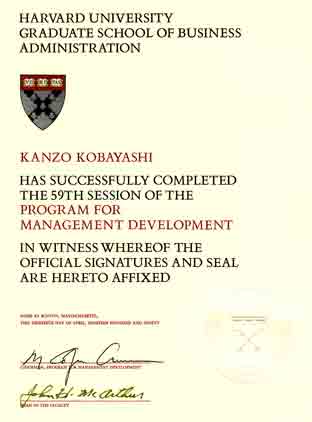
>Top 1. SUMMARY (PMD Professors):
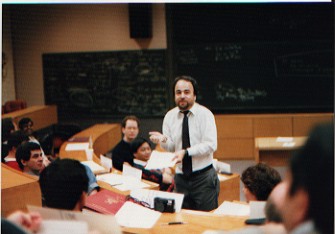
- PMD spring session of HBS in 1990 which I participated counts
59th. The session uses about 200 case studies selected from several
thousand cases HBS holds. The case study is a basic material used
in the program, which is somewhat a type of induction method. These
materials are not only interesting but seem effective in such an
age of transformation with full of exceptions and unexpectedness.
- The nine professors involved in PMD program are all prominent
and experienced in MBA and other programs, who have mostly functioned
as business consultants of public or private organizations.
- At the end of the program, such professors are evaluated by the
participants by 5 degrees in 1) how well prepare the cases, 2) how
enough the related knowledge, 3) how well make the presentation,
4) how well make the participants understand.
- HBS emphasizes the result of research should be published in
the visible media, usually expressed as "Publish or Perish".
- <Professors at PMD-59>
- 1) Prof. Colyer Crum (Chairman of PMD-59): Corporate Financial
Management
- 2) Prof. Michael Beer : Organizing & Managing People
- 3) Prof. Stephen. P. Bradley : Competition & Strategy
- 4) Prof. Robert D. Buzzell : Marketing Management
- 5) Prof. James L. McKenney : Information Systems & Control
- 6) Prof. Paul A. Vatter : The Art & Science of Negotiation
- 7) Assistant Prof. Dennis J. Encarnation : International
Trade
& Investment
- 8) Assistant Prof. Roger E. Bohn : Operation & Technology
Management
- 9) Assistant Prof. Janice A. Klein : Operation & Technology
Management
1. 総括 (PMD教授陣他):
- ハーバードビジネススクール (HBS) のPMD講座は、今年1990年に第59回目 (年2回開催) を迎えた伝統ある研修プログラムであり、数千といわれるケーススタディの中から、約200を厳選して行う帰納法的なケースメソッドは、その内容・手法が興味深いばかりでなく、例外と意外性の多い「変化の時代」の分析には効果的な手法であると思う。
- PMD講座の教授は、MBAなど他の講座も経験した多彩で有能な9名の専任教授で構成されており、十分に事前準備をした上での講義や活発な質疑応答、プレゼンテーションの巧妙さは、マネジメントスキルを実務に応用する上で示唆に富んでいる。また、教授自身も参加者によって評価され、署名・無署名いずれかで学部長宛直送される。評価のポイントは1)よく事前準備したか、2)知識は十分か、3)表現力は十分か、4)参加者をよく理解させたか、などで5段階評価となっていた。
- またHBSの教授は"Publish or Perish"といわれるように、研究成果を見える形で出版することが重要とされる。
- <PMD教授陣一覧>
- 1) Colyer Crum教授 (PMD主任) : Corporate Financial Management
- 2) Michael Beer教授: Organizing & Managing People
- 3) Stephen. P. Bradley教授: Competition & Strategy
- 4) Robert D. Buzzell教授: Marketing Management
- 5) James L. McKenney教授: Information Systems & Control
- 6) Paul A. Vatter教授: The Art & Science of Negotiation
- 7) Dennis J. Encarnation助教授: International Trade & Investment
- 8) Roger E. Bohn助教授: Operation & Technology Management
- 9) Janice A. Klein助教授: Operation & Technology Management
- For the optional cases,
- Prof. Hinsey (US Corporate Law),
- Prof. Meershwam (Financial Services Organizations.
- For the special cases,
- Prof. Michael Porter,
- Prof. George Lodge,
- Prof. Richard Tedlow.
- The PMD participants are mostly from worldwide corporate or governmental
organizations, who belong to rather hard workers with ages around
40 with enough business experiences, whose titles are managers or
general managers. The discussion and debate with these people are
tough but interesting. The debate or expression of opinion in the
class is regarded as a somewhat contribution. Pretending as a representative
from Japan, I tried to have interactive communication with them
as much as possible.
- Human networks with such professors and participants will be valuable
channels in various occasions in the future. (Every two year reunion
of alumni program is scheduled to maintain the network.)
- I try to apply the experience or know-how of PMD to various business
occasion at Itochu. Also, I recommend Itochu to send trainees regularly
to HBS as a part of corporate training programs.
- その他に、選択科目では、
- Hinsey教授(US Corporate Law),
- Meershwam教授(Financial Services Organizations)。
- また特別講義として、
- Michael Porter教授、
- George Lodge教授、
- Richard Tedlow教授などの講義が行われた。
- PMD参加者は世界の大企業からの40歳前後の中堅幹部から成る「論客」が多く、教授あるいは参加者間との実務経験に基づく活発な質疑・意見には迫力があった。発言すること自体がParticipationであり、Contributionであるとの評価が徹底しており、特に日本からの参加者として双方向コニュニケーションに努めた。
- 教授陣およびPMD参加者との人脈ネットワークは、今後様々な局面での貴重なチャネルとなり得る。 (また今後2年に1度、数日間のReunionの予定があり、HBS人脈の維持は計画的である。)
- PMDでの経験・ノウハウを今後の伊藤忠の業務に活かす努力を継続したい。更に、伊藤忠が研修計画の一環として継続的にHBSに研修生を派遣されることを推奨したい。
>Top 2. CASE STUDIES:
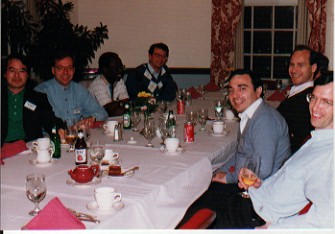
- The case studies at HBS are made in the regular style and format.
The cost of making one case study is said about $10,000, which is
occasionally revised and follow-up cases are made as well as addition
of totally new case studies. These are all assets of HBS which constitute
important know-how of education methodology. These cases are made
by not only public data but contain insider cooperation including
the relevant chairman or president, who is sometimes invited by
HBS as guest speakers for their own case study. These cases are
also composed as vivid audio-visual case materials.
- A typical case study composes 1) preface (mentioning major topics
or introduction), 2) background about the organization, 3) description
about development and/or success story, 4) change of circumstances
or conditions, 5) restructure or response of the organization, 6)
the process thereafter or unexpected growth, etc. The average volume
of each case is about 30 to 40 pages, and if needed additional case
studies are made like case-b, case-c, case-d and so on. Even the
contents became historical events, but they look still fresh and
have useful lessons applicable even today.
- They are written in plain American English. Even the language
is not so difficult, but it requires us continued concentration
of rapid reading of the volume of them. The statistics or charts
relevant to the theme are attached to supplement the contents,
and the ability to relate or neglect the data or chart with the
story essence is very important. Additional reading and/or offprint
from
"Harvard Business Review" are distributed, which are
useful in understanding the case, but require more time and energy
in reading over them.
- Reference books (sometimes written by the professor) are recommended
us at least to skim or browse the related portion, or even worthy
to look at the chart or graph only.
2. ケーススタディ:
-
HBSのケーススタディはほぼ一定のフォーマットで構成されている。1ケースを作成する費用は平均約$10,000ともいわれ、新規ケースのみならず、ケースの更新・追加も行われ、教育効果
を考慮したHBSノウハウの結集ともいえる内容となっている。ケースの選択は、公表データだけでなく、対象企業の全面 的な協力の下で作成されたものが多く、事実、当該企業の会長・社長などがHBSに招かれ特別
講演した様子がビデオに収められており、多彩なAV教材となっている。
-
ケースは通常、1)前文 (問題点を示唆する序文) 、2)対象企業等の設立の経緯・背景、3)発展・成功の記述、4)環境・条件の変化、5)組織変革・対応策、6)その後の経緯あるいは意外な展開となっており、参考資料を加え、平均30~40ページのレポートとなっている。また必要に応じ、ケースB、ケースC...と追加のケースが作成されることもある。古い年代のケースであっても、内容は新鮮で刺激的である。
-
ケースの文体は簡潔な米語で言語そのものは難しくはないが、分量が多いためかなり速読と集中力が要求される。付属のデータも、内容を理解・補強するためのデータに限定しており、本文と関連する数字・図表の読み取り能力あるいは関係のない部分を無視する能力も重要である。
-
ケースとは別に、やや一般論を述べた副読資料、特にHBS紀要である"Harvard Business Review"の抜粋が配布されることもあり、むしろこちらを先に呼んだ上でケースを読むと理解が早いが、問題は時間との勝負である。
-
さらに推薦図書 (教授自身の著書もある) の関連部分をSkimまたはBrowseせよとの宿題も出されるが、これは少なくとも図表を眺めるだけでも必要である。
>Top 3. JAPANESE ISSUE:
- Reflecting Japan-US structural impediments initiative or recovery
of competitiveness of US economy, the cases of Japanese issue with
in-depth data and analysis are specially arranged as Japanese issue.
Such analysis about Japanese economy with some cultural background
also reflects understanding or perception of US leaders or government
about Japan. (It is usually said that the undergraduate of Harvard
University seems sympathetic to the opinions of Democrats, but HBS
to the Republicans. )
- HBS cooperated with Nomura Research Institute prepared detailed
case studies about Japan, whose contents are quite analytical pointing
out the characteristics of each industry.
- Japanese issue program contains the cases of Ajinomoto, Canon,
Kao, Asahi Beer, Mori Building, Nissay Insurance, Matsushita Electric,
Komatsu. No cases about Sogo-shosha, but Prof. Crum, chairman of
PMD, wished to have the case containing Ataka Corp or Recrute issue.
In Asahi Beer case, I was asked to explain how different the taste
of successful Asahi Super Dry is to the participants who have not
yet tried.
- Regarding semiconductor issue, there was a case how to simulate
so-called Japan Bashing. I claimed the unfair treatment compared
to the case of Airbus versus Bowing, which treats both opinions
fairly from US and from European side.
3. 日本特集:
- 現在進行中の日米構造協議や米国経済の競争力回復への課題などの背景も反映して、日本に関するケーススタディや分析が目立っており、かつその内容もデータに基づいた本質をついたものが多く、米国知識人や米国政府の対日観を理解する上で極めて参考になった。(Undergraduateは、伝統的に民主党のバックボーンであるが、HBSはやや共和党の主張に近いようである。)
- HBSは野村総合研究所との提携により、より緻密なケーススタディを用意しており、日本人が聞いてもその内容の深さ、着眼点は鋭かった。
- 日本特集のケースとしては、味の素、キャノン、花王、アサヒビール、森ビル、日本生命、松下電器、小松製作所などであった。商社に関するケースはなかったが、PMDの主任でもあるCrum教授によれば、できれば安宅やリクルートのケースも作成したいとの意向であった。アサヒビールのケースでは、スーパードライはどのような味なのかをまだ未経験の人に説明させられた。
- 半導体問題では、Japan Bashingのシミュレーションをグループでやらされたケースもあった。流石に、小生としてはJapan
Bashingを前提とした扱いはあまりにも不公平で客観性を欠くとの異論を唱えた。Airbus対Bowingのケースは両論併記となっており議論も双方の立場を留意した展開となっていたのと対照的であった。
>Top 4. EUROPEAN ISSUE:
- Reflecting the drastic change since 1989 in East Europe and proposed
European unification in 1992, the special European issue program
was held intensively using real-time online database (Nexis) in
the class. There seemed more vivid discussion about European issue
than the Japanese issue, probably because of the more volume of
information and more understanding or sympathy about Europe than
Japan.
- Some professors of HBS are assigned as advisors to the new East
European governments. And the first MBA students from the former
Soviet Union area are scheduled to come (China already dispatched).
These show HBS functions as a window of East and West academic interchange.
- There are interesting themes focusing 1) comparative analysis
of Triad structure of US, Europe and Japan, 2) Fort Europe will
be formed by 1992 Unification, and 3) Expanded European economy
including East Europe, analyzing which will be a winner or a loser,
which will be the best scenario or the worst scenario of the forecast,
and so on.
4. 欧州特集:
- 昨1989年来の東欧情勢の激変、1992年欧州統合などを反映して、オンラインデータベース(Nexis) を活用しながら、欧州関連を集中的に取り上げ、臨場感あふれる議論を展開したのは印象的であった。欧州に関する議論では、日本に対する議論よりも、さらに精度が高く、活発であったのは
(米国からだけの見方が強すぎるきらいはあるものの) 欧州に対する情報量の多さや参加者の理解力・親近感などの面で差が合ったためと思おう。
- HBSは東欧の新政権のアドバイザを引き受けている教授もあり、また来年から初めて旧ソ連からのMBA留学を認めるなど (中国はすでに派遣中)
HBSは東西学術交流の窓口的存在になっている。
- 欧州に関する分析でも、米・欧・日のTriad構造での比較、1992年欧州統合および東方を含めた拡大欧州市場が形成される場合のWinnerとLoserとの分析、将来のBest
scenarioとWorst scenario予測など多面的な分析がなされた。
>Top 5. IT ISSUE:
- The Information Technology issue as another resource of corporate
competitiveness is discussed, including the function of IT, how
to introduce the latest IT based systems, etc. This theme will be
reported separately, because which contains too suggestive and interesting
points. The theme on this issue covered the brief historical background
about development of semiconductor and computer.
- The internal friction usually occurred in the traditional organization
regarding introduction of latest IT systems, and typical success
and unsuccess stories of several industries (from Airline to Cookie
chain) using latest IT are also exciting us.
5. 情報通信関連テーマ:
- 企業の競争力分析の要因の一つとして、ITの役割、その導入効果など相当詳しく言及した。その内容は、一般論の範囲とはいえ、非常に参考になったので別途報告したい。
- 情報通信に関しては、半導体やコンピュータの歴史からシステム導入に至るまでの社内組織の葛藤、個々の産業での活用の成功例 (Airline
industryからCooke chainまで) などITを巡る多彩な議論展開は参考になった。
> Top 6. PMD ALUMNI:
- The total participants to PMD-59 are 106, the half of which is from
US, while only 6 are Japanese (Mitsui-America, Yasuda Trust Bank-America,
Industrial Bank of Japan, Suntry, Komatsu, and Itochu (myself). Women
participants are 10.
- Their companies are:
6. PMD参加者:
- PMD-59参加者は、総勢106名で、内訳は米国が約半数で、日本からの参加者はわずか6名であった。 (米国三井物産、米国安田信託、興銀、サントリー、小松製作所、それと伊藤忠各1名)
女性の参加者は10名であった。
- 日本以外の主な参加企業は、
- <US>
- (Public): NASA, Union Pacific Railroad, Pacific Gas &
Electric, US Navy, Florida Power & Light, Public Service Electric
& Gas, US Post, Pacific Bell, Consolidated Natural Gas
- (Manufacturing): GM, IBM, DEC, Apple, Polaroid, Corning,
Xerox, GE Aircraft Engines, International Paper, Colgate-Palmolive,
Bausch & Lomb
- (Financing): Citi Corp, Manufacturers Hanover Trust,
Central Jersey Bank & Trust
- (Other) : Consolidated Freightways, ELF Exploration, Washington
Post, Marquette Univ, Conoco, Capital Cities-ABC, Walt Disney
- <米国>:
- (公共) :NASA, Union Pacific Railroad, Pacific Gas & Electric,
US Navy, Florida Power & Light, Public Service Electric &
Gas, US Post, Pacific Bell, Consolidated Natural Gas
- (製造業) :GM, IBM, DEC, Apple, Polaroid, Corning, Xerox, GE
Aircraft Engines, International Paper, Colgate-Palmolive, Bausch & Lomb
- (金融) :Citi Corp, Manufacturers Hanover Trust, Central Jersey
Bank & Trust
- (その他) :Consolidated Freightways, ELF Exploration, Washington
Post, Marquette Univ, Conoco, Capital Cities-ABC, Walt Disney
- <Europe>:
- (Public): British Telecom, Health Authority (UK),Baxter
Healthcare (UK)
- (Manufacturing): Lucas Aerospace (UK), Crown Berger Europe
(UK), Waterford Wedgwood (UK), Kymmene (Finland), Nestle Foods (Swiss),
ABB ASEA Brown Boveri (Swiss)
- (Financial): Midland Bank (UK), Credit Agricole (F), Union
Bank of Norway, Hypo Bank (G)
- (Other): British Petroleum, P&O (UK), Spicer &
Oppenheim (UK), McKinsey (Belgium), Atag/Ernst & Young
(Swiss), Nornew ANS (Norway)
- <欧州>:
- (公共) :British Telecom, Health Authority (UK),Baxter Healthcare
(UK)
- (製造業) :Lucas Aerospace (UK), Crown Berger Europe (UK), Waterford
Wedgwood (UK), Kymmene (Finland), Nestle Foods (Swiss), ABB ASEA
Brown Boveri (Swiss)
- (金融) :Midland Bank (UK), Credit Agricole (F), Union Bank of Norway,
Hypo Bank (G)
- (その他) :British Petroleum, P&O (UK), Spicer & Oppenheim
(UK), McKinsey (Belgium), Atag/Ernst & Young (Swiss),
Nornew ANS (Norway)
- <Other Area>
- (Public): Universite du Quebec (Canada), Taxation Office (Australia),
Treasury (NZ), Singapore Economic Development Board, Atomic Energy
of Canada, Ministry of Defense (Singapore), Hong Kong Government
- (Manufacturing): Novatel Communications (Canada), Berol
Novel (Sweden), Hidada (Saudi), Chinese Petroleum (Taiwan), Lucky
(Korea), Impsa (Argentine)
- (Financial): First National Bank of S-Africa, Nedperm Bank
(S.Africa), United Bank of Africa (Nigeria)
- (Other): Rand Mines (S.Africa), Arthur Anderson (Nigeria),
Cavenpi (Venezuela), Al-Ahli Bank of Kuwait
- Ages of the participants are around 36 - 48 (rather younger from
developing countries), who are mostly managers, vice presidents
(or even directors) status in their organizations.
- <他地域>:
- (公共) :Universite du Quebec (Canada), Taxation Office (Australia),
Treasury (NZ), Singapore Economic Development Board, Atomic Energy
of Canada, Ministry of Defense (Singapore), Hong Kong Government
- (製造業) :Novatel Communications (Canada), Berol Novel (Sweden),
Hidada (Saudi), Chinese Petroleum (Taiwan), Lucky (Korea), Impsa
(Argentine)
- (金融) :First National Bank of S-Africa, Nedperm Bank (S.Africa),
United Bank of Africa (Nigeria)
- (その他) :Rand Mines (S.Africa), Arthur Anderson (Nigeria), Cavenpi
(Venezuela), Al-Ahli Bank of Kuwait
- PMD参加者の年齢は概ね36~48歳で (途上国出身者はやや若い) 、Manager, Vice Presidentクラスが多い。
(一部はDirectorもいる。)
>Top 7. PMD LIFE STYLE:
- It is the HBS style that burdening with 120% load and constant
pressure may arouse studying effectiveness of the participants.
3 months concentrated session seemed harder in the bulky curriculum
for non-native English speakers (who, on the contrary, have the
advantage of showing unique idea based on non English knowledge,
etc.) MBA copes with 2 cases a day, while PMD 3 in a day, which
means 150% burden only in reading the cases.
- A preparation for a case needs about 2-3 hours, and 3 cases needs
6-9 hours a day; which determines how to participate and contribute
in the class, usually under insufficient preparation and sleepy
condition.
- Besides the language ability, wide knowledge about each industry
and latest technological trend is particularly important to contribute
in the class discussion. Experiences at Sogo-shosha such as overseas
experience as an expatriate, simple and quick reporting behaviors
trained at Itochu, and the materials of the former Itochu's training
programs named CSDP are all useful.
- Japanese Almanac and some business books written by the consultants
are also helpful.
- A small discussion group named 'CAN ' (which has a meaning of
'Jail' in US slang) is formed by about 8 participants in two ways;
first the fixed CAN for every evening discussion and preparation,
secondly the changeable CAN which is newly appointed every week
to have morning meeting from 8 to 9 o'clock. Such CAN has a rotary
chairman, who can experience how to lead the discussion. To participate
actively, a preparation of the case study is essential; which requires
the balanced way of life considering efficient and effective spending
of time. This life style itself looks a somewhat simulation which
may be necessary qualification for top management.
7. PMDライフスタイル:
- Native speakerの参加者を対象に120%の負荷を与え、常にプレッシャをかけつつ学習効果を上げるというのはHBS流らしく、3ヶ月とはいえ、特にNon
native speakerにとっては分量的に厳しい内容であった。 (その分ローカルな知識や発言内容のユニークさなどで補完できたと思うが...)
MBAでは1日2ケースなのに、PMDでは1日3ケースということで150%の負荷ともいえる。
- ケースの予習には毎日2~3時間x3科目、計6~9時間が必要で、どうしても不十分な準備のままで、授業・会議でそれなりの情報発信ができるかが試されているようであった。
- 語学力の必要性はもちろんだが、それ以上に、広く各産業の基礎知識、問題点や関連知識、新技術動向などへの日頃の好奇心が授業において「お客さん」にならないためには特に必要である。その点で、商社の海外駐在経験や、伊藤忠で日常的に行われている要領を得た簡潔な報告の習慣、かつての伊藤忠の社内研修プログラム
(CSDP) の各教材などの経験も役に立った。現代用語辞典などの日本語のビジネス書も参考になった。
- CAN (米俗語でJAILの意味もある) と呼ばれる8人程度の小グループが、固定的なグループでの毎晩の討論に加えて、毎週新たに組み合わされた流動的なグループで毎朝8~9時までの自由討論となる。これら小グループのリーダも輪番で決められ、議論の進め方などリーダシップの経験も体験する。これらの活発な議論に参加するためには、事前の自習が必須で、そのためには、体力・気力のバランスを考えて効率・効果を挙げるという意味では、生活習慣全体がビジネス幹部のシミュレーションそのもののようにも思えた。
- <Fixed CAN-8 members I belonged>
- Michael H. Paine (Mike), CNG Producing Co., LA, USA
- Stephen R. Jenkins (Steve), DEC, MA, USA
- Nancy E. Polis (Nancy), GM, MI, USA
- James M. Killaly (Jim), Australian Taxation Office, Australia
- Adedotun Sulaiman (Dotun), Arthur Andersen, Nigeria
- Ulrich Schurenkramer (Uli), Hypo Bank, Germany
- Juan M. Saavedra (Marcos), Tintas Coral SA, Brazil
- Kanzo Kobayashi (Koby), C. Itoh & Co., Japan
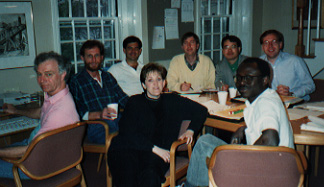
- In addition, the voluntary Special Interest Groups are sometimes
organized. I belonged;
- 1) Expatriate Group composed of non-US expatriates,
- 2) Telecommunication Group from telecom related industries,
- 3) Five-Dragon Group from Korea, Taiwan, Hong Kong, Singapore
and Japan,
- 4) left-hand Drivers Group from England, Australia, Japan,
etc.
- <小生の属した固定的なCAN-8の仲間>
- Michael H. Paine (Mike), CNG Producing Co., LA, USA
- Stephen R. Jenkins (Steve), DEC, MA, USA
- Nancy E. Polis (Nancy), GM, MI, USA
- James M. Killaly (Jim), Australian Taxation Office, Australia
- Adedotun Sulaiman (Dotun), Arthur Andersen, Nigeria
- Ulrich Schurenkramer (Uli), Hypo Bank, Germany
- Juan M. Saavedra (Marcos), Tintas Coral SA, Brazil
- Kanzo Kobayashi (Koby), C. Itoh & Co., Japan
- また独自グループによる懇親も盛んで、小生の場合は
- 1) Expatriate Group (海外駐在員の会) 、
- 2) Telecommunication Group (電気通信関連者) 、
- 3) Five-Dragons Group (日本+Niesの会) 、
- 4) Left-hand Drivers Group (一部英連邦+日本) など
のSpecial Interest Groupで夕食など適宜交流を図った。
-
>Top <A typical day at PMD>
- 07:00~08:00 Kresge Dinning Room: Breakfast (mostly skipped)
- 08:00~09:00 Mellon Meeting Room: CAN Group discussion
- 09:15~10:30 Cumnock 103: Class (first period)
- 10:30~11:00 Mellon hal: Coffee break
- 11:00~12:15 Cumnock 103: Class (second period)
- 12:15~13:15 Kresge Dining Room: Lunch
- 13:15~14:30 Cumnock 103: Class (third period)
- 14:30~18:00 Mellon Private Room: Preparation (until dinner) (this
time is essential!)
- 18:00~19:30 Kresge Dining Room: Dinner
- 19:30~22:00 Mellon Private Room: Preparation
- 22:00~24:00 Mellon Meeting Room: CAN Group discussion
- 24:00~01:00 Mellon Private Room: Preparation (sleeping time is
important.)
- Advice:
Time management considering self condition. Minimum sleeping is
a must. Preparation of the cases in weekends will be fruitful. Outside
dinners at restaurants with friends are refreshing as well as some
sports. (Beware that the foreigners are physically stronger.)
-
<典型的な一日>:
- 07:00~08:00 Kresge食堂 朝食 (実際はほとんどスキップ)
- 08:00~09:00 Mellon 会議室 CAN Group (7~8人) 討論
- 09:15~10:30 Cumnock 103 授業 (1時間目) (53人)
- 10:30~11:00 Mellonホール Coffee break
- 11:00~12:15 Cumnock 103 授業 (2時間目) (53人)
- 12:15~13:15 Kresge食堂 昼食
- 13:15~14:30 Cumnock 103 授業 (3時間目) (53人)
- 14:30~18:00 Mellon自室 自習 (ここが重要で夕食までにピッチあげて読む)
- 18:00~19:30 Kresge食堂 夕食
- 19:30~22:00 Mellon自室 自習
- 22:00~24:00 Mellon会議室 CAN Group (7~8人) 討論
- 24:00~01:00頃 Mellon自室 自習 (いいかげんで寝ないと明日が大変)
- ポイント:
自己管理によるペース配分。特に最小限の睡眠維持は必須。日曜日やBreakの時の先取り学習が有効。時々気分転換としての外食懇親、スポーツも必要
(但し、外人には体力負けするので適当に)
>Top 8. EFFECTIVE E-MAIL:
- All the rooms of participants, professors, administration, conference
rooms are connected by the campus LAN, and the e-mail system is
used as a basic communication tool through the program. PMD introduced
the latest Macintosh-II CX machine for each participant since the
last session. Macintosh is popular than the former IBMPC/AT based
system because of easiness in using PC. Even the laundry service
company is connected to this network. The campus network is supported
by the specialists. I experienced my PC troubles happened resulting
from trying to use two-bite Japanese character, but fortunately
remotely recovered by the specialist's support.
- Most of the PMD participants are accustomed to the keyboard, but
the experience of PC operation is not so enough. After having 2
days intensive lectures, most people can manipulate basic software
such as e-mail, word processing, spread sheet, probably owing to
the easiness of Macintosh.
- We can use database of the carriers and hobbies of all participants,
for example, if relieve it by the key words such as 'telecommunication'
and 'tennis', we can choose small interesting group and send e-mail,
inviting or making questions to the friends related to the topics.
Regarding to the cases of Japanese, many e-mail questions came to
me. E-mail is not a real-time communication which will not disturb
ongoing works of the receivers. Furthermore, the communication by
written language will be more helpful to nonnative speakers, who
usually feel some disadvantage in debating resulting from lack of
vocabulary and eloquence in via-a-via communication.
8. 電子メールの効用:
- 参加者各室に専用のPCと教授、事務局、各会議室のPCとがLAN (Ethernet) で接続され、生活の基本メディアとして電子メールが導入されており、効果を上げた。前回のPMDから最新のMacintosh
-II CX)が導入され、それまでのIBMPC/ATに比べ格段とその操作性が向上し評判も良かった。出入りの洗濯屋にも電子メールで連絡できる。またPC/ネットワークの専門家ともつながっており、リモートサポートが得られる。小生は、日本語OSを使おうとして文字化けを起こし、リモートで直してもらった経験もあった。
- ほとんど全員がキーボードに慣れているとはいえ、PC操作に習熟しているのは一部だったにも拘わらず、2日間の集中PC講座で、電子メール、ワープロ、表計算などのソフトの基本操作を修得できたことは、必要性に迫られているとはいえ、Macintoshの使いやすさとおもしろさに起因していると思う。
- PCには、関係者全員の履歴・趣味などデータベース化されていて、例えば、各自の経歴の内、"Telecommunication"とか"Tennis"などとキーワードで検索することで、任意の小グループを選び出し、交流を図ることができた。また質問などもテーマに関連した業界の人に電子メールを送付することもできる。
(当然、日本に関するケースでは質問メールが飛んでくる。) 電子メールは自習と同時併行的なノウハウ交流が拡大しただけでなく、書き言葉での議論を展開でき、これはNon-native
speakerにとってさほど不利ではなくなることを意味する。
>Top 9. PMD KEY WORDS & KEY PHRASES:
- All the participants are assumed to read and understood the case
studies beforehand, and the professor develops the case story, and
raises in-depth discussion derived from each unique opinion and
experience, walking around in the class. (There are big name plate
on each desk which easy to be appointed to participate the discussion.)
- Followings are the frequently appeared as key words or key phrases.
In the class most speech was allowed by raising hand, but sometimes
suddenly appointed by the professor. It is usual that active debate
occurs between the participants, including objections or comments
from various places. The professors have enough skillfulness in
teaching or introducing method how to activate the class and how
to bring the discussion into meaningful conclusion, including variety
of tension, smartness, wit or joke as needed.
- * "Competitive strategy":
- There are serious of books written by Michael Porter, one
of the famous professor of HBS. Competitiveness appeals in
various situation of organization, research & development,
production, marketing. The viewpoint of competitive advantage or competitive edge will be applied not only in economics,
but appears in politics, military and cultural analysis.
- * "KSF = Key Success Factor":
- At the analysis of case study always starts from the questionnaire
of "What is the Key Success Factor?" This
phrase as well as 'what is the key unsuccess factor' is always
important in reading the case study.
- * "What is the problem?":
- This question is to pick up the essential point and abstract
from lengthy story, usually full of various non essential noises.
To grasp the essence in shorter time, and to express in simple
and persuasive key phrase is identical with understanding the
story itself. And additional comments, exception, contradiction,
or even objection which may develop the discussion in the classroom
is welcomed, rather than simple compilation of the case materials.
- * "Articulation":
- Literally this word originated from anatomy meaning 'to unite
by forming joints'. But this is used in the cases of to analyze
clearly, showing the reasons or preferably figures, explaining
more concrete or meaningful relation of the context or story.
Vague expression, stereotyped opinion or just a mere enumeration
of words is attacked by the professor with bullet of question
of 'In what sense?', and are asked to explain differently
adding the reasons or examples.
- * "Why?", "Why not?":
- Whenever speaking confidently, the professor gives additional
questions with 'Why?' and 'Why not?' So we must
prepare the answers responding the next 'Why, Why not' questions.
The answer of 'I don't know' means suicide. (If the answer becomes
irrelevant or unrelated, which is much better than silence.)
- * "What would you do?":
- In the significant decision making situation of the case study,
'what would you do' question is given if you were the
person concerned. Historical fact is only one, but logical experiments
are always possible and useful to think about many if's.
9. PMDキーワード/キーフレーズ:
- 授業では、全員がケースを読み、理解していることを前提に、双方向の議論が展開された。教授は、参加者から、経験に基づくユニークな視点での議論を促すべく、教室中を動き回りながらさまざまな問いかけを発する。
(各人の机には大きなネームプレートがあり、名指しの質問もある。)
- 以下は、教授達の口癖ともいうべき、キーワードやキーフレーズである。
授業では、発言は指名されることもあるが、多くは挙手による自発的は発言である。時には参加者同士の議論展開となることもあり、極めて活発であった。緊張感を一定に保ちつつ、かつジョークも交えながら授業を進めるノウハウには感心した。
- ■"Competitive strategy" (競争優位)
- HBSの看板教授であるMichael Porterの同名の著書シリーズが有名で、Competitivenessが組織、R&D、生産、市場分析などあらゆる局面に登場する。経済のみならず、政治も軍事も文化の分析にもCompetitive
advantageやCompetitive edgeなどのフレーズがいつも登場する。
- ■"KSF = Key Success Factor" (成功の鍵)
- ケーススタディの分析において、必ず毎回質問されるのが、"What is Key Success Factor?"で、いつものこのKSFを念頭においてケースを読み、考えることを要求される。
- ■"What is the problem?" (問題の本質)
- 大量で雑多なノイズの多い現実のデータの中から、まず問題点を把握し、抽象化する思考を鍛えられる。問題点把握は、文脈、背景などより大きな流れの中でスピーディに抽出され、その表現は簡潔かつ表現力のある語句が選択される。
(ケースに何が書かれてあったかをまとめたり指摘するだけの優等生的な発言よりも、むしろ異論・反論・矛盾指摘、例外的なコメントなどが歓迎され、さらに議論発展のテーマとなる。)
- ■"Articulation" (具体的な分析)
- 字義は「文脈化」だが、分析はより具体的 (数字があればさらに良い) であり、かつ項目の分類、関連づけが明確で思想があることが要求される。あいまいな表現や単なる羅列に対しては、"In
what sense?"の追撃を受け、再度、別の表現、追加の説明、例示を要求される。
- ■"Why?, "Why not?" (何故そうなのか、何故そうでないのか)
- 自信を持って発言する時ほど、教授からはWhy?とWhy not?の追加質問をされる。参加者は、いかなる追加質問に対しても、考えられる限りのWhyとWhy
notの自問しておくことが重要であり、"I don't know"は禁句である。 (少々マトがはずれたり、それはさて置きの発言になったとしても無言よりは評価される。)
- ■"What would you do?" (君ならどうするか)
- ケーススタディの重大な意志決定の局面では、もし君が当事者だったらどうするか、という設問がよくなされる。ケースの歴史的な事実は一つしかないが、
(後で追加資料が配布されることが多い) 思考・論理実験として様々な議論展開が行われる。
>Top 10. BIBLIOGRAPHY:
- Many related books are published (some are written by HBS professors)
as well as the references related information & telecommunication.
Such books are recommended us to skim or browse as the related
cases. The coop at HBS is one of famous spot where useful business
books are sold.
- <Business Administration>
- - Michael Porter: "Competitive strategy", Competitive
in global industries", "Competitive Advantage of Nations"
- - Robert Buzzel, etc.: "Profit impact of market strategy
(PIMS) principles",
"The Marketing Challenge of 1992"
- - Robert Hayes, etc.: "Dynamic Manufacturing"
- - Michael Beer, etc.: "Managing human assets"
- - Robert Higgins: "Analysis for financial management"
- - Arnold Hax, etc. "Strategic management"
- - Lothar Seiwert: "time is money: save it"
- - Gaun Kevtm etc: "Principles of financial management"
- - Richard Brealey, etc: "Principles of corporate finance"
- - Janice Klein:"Revitalizing manufacturing"
- - Benjamin Friedman: "Day of reckoning"
- - Ravi Batra; "The great depression of 1990"
- - E.F.Schumacher: "Small is beautiful"
- - Howard Raiffa: "The art & science of negotiation"
- - Miles Livingston:"Money & capital markets"
- - Thomas McGraw: "America versus Japan"
- - Laurence Shames: "The big time, The Harvard Business School's
most successful class & how it shaped America"
- - George Lodge, etc.: "ideology and National competitiveness"
- - Paul Kennedy: "The rise and fall of the great powers"
10. 参考文献:
- ケーススタディに関連した分野の参考書 (HBS教授の書いた本も多い) および情報通信分野での参考文献を挙げる。授業の進展に合わせて、副読本の関連箇所をSkim、Browseせよということだったが...なお、HBSのCoopは、米国でのビジネス書が集中している場所としても有名。
- <経営一般>
- - Michael Porter: "Competitive strategy", Competitive
in global industries", "Competitive Advantage of Nations"
- - Robert Buzzel, etc.: "Profit impact of market strategy
(PIMS) principles"
"The Marketing Challenge of 1992"
- - Robert Hayes, etc.: "Dynamic Manufacturing"
- - Michael Beer, etc.: "Managing human assets"
- - Robert Higgins: "Analysis for financial management"
- - Arnold Hax, etc. "Strategic management"
- - Lothar Seiwert: "time is money: save it"
- - Gaun Kevtm etc: "Principles of financial management"
- - Richard Brealey, etc: "Principles of corporate finance"
- - Janice Klein:"Revitalizing manufacturing"
- - Benjamin Friedman: "Day of reckoning"
- - Ravi Batra; "The great depression of 1990"
- - E.F.Schumacher: "Small is beautiful"
- - Howard Raiffa: "The art & science of negotiation"
- - Miles Livingston:"Money & capital markets"
- - Thomas McGraw: "America versus Japan"
- - Laurence Shames: "The big time, The Harvard Business School's
most successful class & how it shaped America"
- - George Lodge, etc.: "ideology and National competitiveness"
- - Paul Kennedy: "The rise and fall of the great powers"
>Top <Information & telecommunication>
- - James McKenney, etc.: "Corporate information systems
management"
- - Marie Anchordoguy: "Computer In. Japan's challenge to
IBM"
- - Everett Rogers: "Communication technology, the new media
in society"
- - Paul Heron: "Expert systems, tools & applications"
- - Hans Qyeusser: "The conquest of the microchip"
- - Shoshana Zuboff: "In the age of the smart machine"
- - Richard Saul Wurman: "Information anxiety"
- - Stephen Hall: "Invisible frontiers"
- - Lou Mobley, etc. "Beyond IBM"
- - Stewart Brand: "The Media Lab, inventing the future
at MIT"
- - Heinz Pagels: "The dreams of reason, the computer and
the rise of the science of complexity"
- - Ulyless Black: "Computer networks, protocols, standard,
interface"
- - James Gleick: "Chaos, making a new science"
<情報通信関連>
- - James McKenney, etc.: "Corporate information systems
management"
- - Marie Anchordoguy: "Computer Inc. Japan's challenge
to IBM"
- - Everett Rogers: "Communication technology, the new media
in society"
- - Paul Haron: "Expert systems, tools & applications"
- - Hans Qyeusser: "The conquest of the microchip"
- - Shoshana Zuboff: "In the age of the smart machine"
- - Richard Saul Wurman: "Information anxiety"
- - Stephen Hall: "Invisible frontiers"
- - Lou Mobley, etc. "Beyond IBM"
- - Stewart Brand: "The Media Lab, inventing the future
at MIT"
- - Heinz Pagels: "The dreams of reason, the computer and
the rise of the science of complexity"
- - Ulyless Black: "Computer networks, protocols, standard,
interface"
- - James Gleick: "Chaos, making a new science
Comment
- Harvard Business School looks like "Major League" in
the study:
- We must be all ears and eyes to everything, and try to contiribute
something in the debate!
- An episode about risk management:
the first day I was requested
to submit the choice of way of corpse in case of sudden death
of myself, where I encountered unexpected terminology: cremation
(not creation) ... This could be a message: "Study hard
nearly to death!"
- HBSは、研究分野でのメジャー・リーグのようである。
- ともかく、全神経を傾けて聴取し、討論では何か貢献するようにしなければ....
- リスク管理に関するエピソード一つ:
初日に私自身の突然に死亡の場合の死体取扱に関する選択を提出するように求められた。そこで以外な単語に遭遇した。火葬である。...これは死ぬ気で勉強に励めというメッセージかも。
 |
Harvard Business
School (PMD-59)
|
Cat: MISPub: 1990
|
Kanzo Kobayashi |
07501u/18206r |
Title |
HARVARD BUSINESS SCHOOL (PMD-59) |
ハーバードビジネススクール研修報告 |
|---|---|---|
Author |
Kanzo Kobayashi | 小林寛三 |
Published |
May 1990 |
1990年5月 |
Index |
||
Why? |
|
|
Summary |
要約 |
>Top 0. Harvard Business School:
|
0. ハーバード・ビジネススクール:
|
 |
 |
>Top 1. SUMMARY (PMD Professors):
|
1. 総括 (PMD教授陣他):
|
|
|
>Top 2. CASE STUDIES:
|
2. ケーススタディ:
|
>Top 3. JAPANESE ISSUE:
|
3. 日本特集:
|
>Top 4. EUROPEAN ISSUE:
|
4. 欧州特集:
|
>Top 5. IT ISSUE:
|
5. 情報通信関連テーマ:
|
> Top 6. PMD ALUMNI:
|
6. PMD参加者:
|
|
|
|
|
|
|
>Top 7. PMD LIFE STYLE:
|
7. PMDライフスタイル:
|
|
|
|
|
>Top 8. EFFECTIVE E-MAIL:
|
8. 電子メールの効用:
|
>Top 9. PMD KEY WORDS & KEY PHRASES:
|
9. PMDキーワード/キーフレーズ:
|
>Top 10. BIBLIOGRAPHY:
|
10. 参考文献:
|
>Top <Information & telecommunication>
|
<情報通信関連>
|
Comment |
|
|